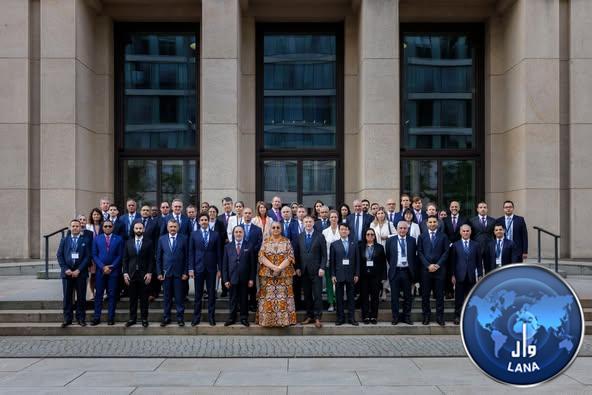Final statement of the meeting of the International Follow-up Committee on Libya in Berlin
Pulbished on:
Berlin, June 20, 2025 (LANA) – Participants in the Berlin Conference acknowledged the work of the Advisory Committee facilitated by the United Nations Support Mission in Libya (UNSMIL) in identifying viable paths to address the core contentious issues impeding progress in the political process.
This came in the final statement of the meeting of the International Follow-up Committee on Libya, held in Berlin and co-chaired by the Special Representative of the Secretary-General and Head of the United Nations Support Mission in Libya (UNSMIL), Hanna Tetteh, and Ambassador Christian Buck, to support the implementation of a Libyan-led and Libyan-owned political process facilitated by the United Nations, leading to a political solution to the Libyan crisis.
The statement commended UNSMIL for facilitating the committee's work and engaging the wider public, as well as political and security actors, to build broad consensus and support for moving forward. It stressed the need to renew international coordination in support of the Mission's efforts, building on the outcomes of the Advisory Committee.
The statement called on all parties to refrain from unilateral actions that would deepen divisions, noting that those obstructing the political process will be held accountable, including under relevant Security Council resolutions.
The participants in the meeting reaffirmed their full respect for and commitment to Libya's sovereignty, independence, territorial integrity, and national unity. They reaffirmed their determination to continue supporting Libya and its people, and their commitment to refrain from interfering in Libya's internal affairs. They urged all international actors to do the same.
The participants noted with regret that while the 2020 ceasefire agreement continues to hold, it has yet to be fully implemented. Initial progress towards a political solution to the Libyan crisis has stalled. This poses increasing risks to Libya's stability and unity, due to the crisis of legitimacy of Libyan institutions, fragmented governance structures, and the rapidly deteriorating economic and financial situation.
The participants commended the efforts of the Libyan parties to achieve national reconciliation, noting the constructive role of the African Union in this regard. They also noted the UN Support Mission in Libya's aspiration to work in close coordination with Member States on any initiative.
According to the statement, the participants reaffirmed their commitment to holding regular plenary meetings of the International Follow-up Committee on Libya to mobilize international support for the UN-facilitated political process, noting that Libya was added to this format in 2021. They also agreed to pursue a more effective and coordinated role for the four working groups (political, economic, security, human rights, and international humanitarian law) and to discuss ways forward.
The following countries and regional organizations participated in the meeting: Angola (current Chair of the African Union), Algeria, China, Egypt, France, Italy, Libya, Morocco, the Netherlands, Qatar, Russia, Saudi Arabia, Spain, Switzerland, Tunisia, Turkey, the United Arab Emirates, the United Kingdom, the United States, the African Union, the European Union, the League of Arab States, and the United Nations.
...(LANA)...




